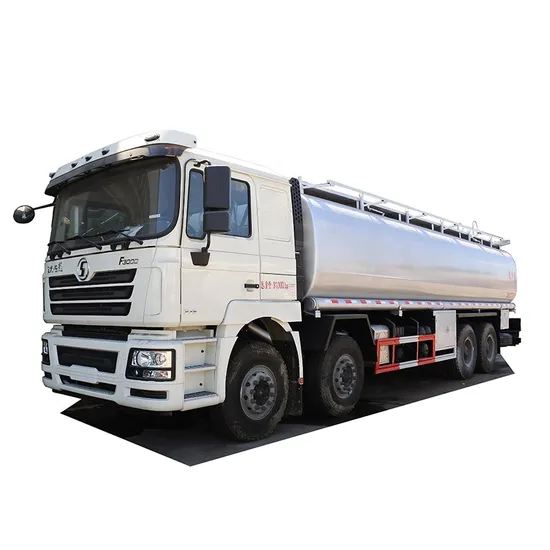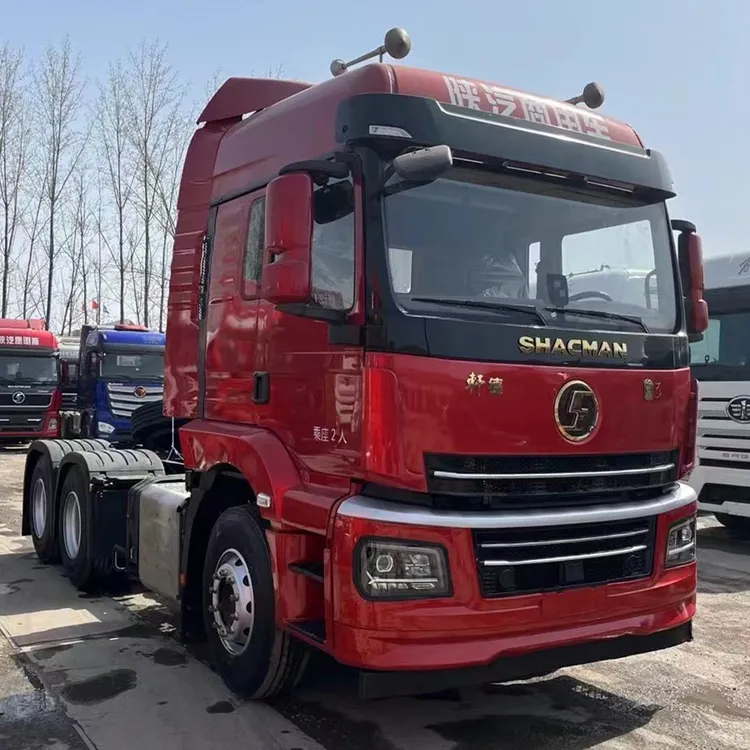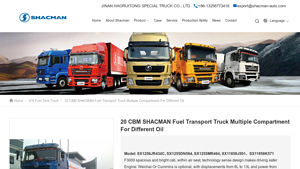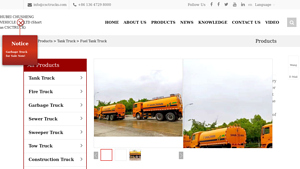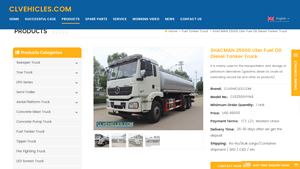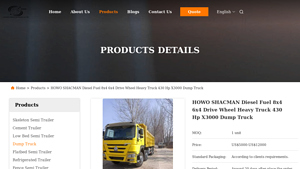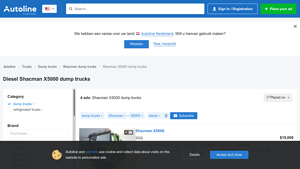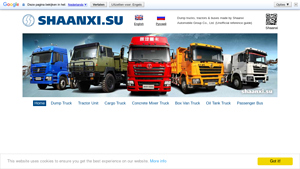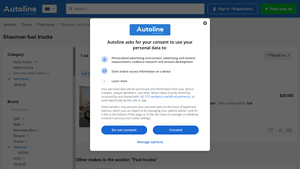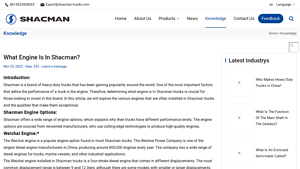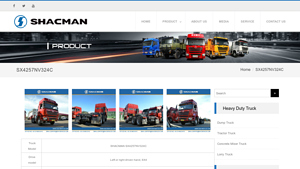Introduction: Navigating the Global Market for diesel Fuel Shacman Truck
In the rapidly evolving landscape of global logistics, sourcing the right diesel fuel Shacman truck can be a pivotal challenge for businesses aiming to enhance their operational efficiency. The diverse applications of these robust vehicles—from transporting fuel across vast distances to supporting construction projects—make them essential assets in the fleets of companies in Africa, South America, the Middle East, and Europe. This comprehensive guide is designed to navigate international B2B buyers through the complexities of the market, providing insights into various types of Shacman trucks, their specifications, and applications tailored to meet specific business needs.
Throughout this guide, we delve into critical aspects such as supplier vetting processes, the significance of understanding local regulations, and cost analysis, ensuring you make informed decisions that align with your operational requirements. By exploring the features of Shacman trucks, including customizable fuel capacities and advanced engineering, buyers will gain clarity on how these vehicles can optimize logistics and fuel transport, ultimately driving profitability.
Empowering international B2B buyers with knowledge and actionable insights, this guide serves as a valuable resource for selecting the right diesel fuel Shacman truck, ensuring that your investments yield maximum returns in a competitive marketplace.
Understanding diesel Fuel Shacman Truck Types and Variations
| Type Name | Key Distinguishing Features | Primary B2B Applications | Brief Pros & Cons for Buyers |
|---|---|---|---|
| 6×4 Fuel Tank Truck | Carries 15,000 to 25,000 liters; multiple compartments available | Fuel distribution, transportation of diesel | Pros: High capacity, versatile; Cons: Requires trained drivers for safety. |
| F3000 Series Fuel Transport Truck | Robust chassis, customizable engine options (180-560 hp) | Long-distance fuel transport | Pros: Durable, reliable; Cons: Higher initial investment. |
| 20000L Fuel Tanker Truck | Made from carbon steel or aluminum; suitable for mixed fuel transport | Construction, agriculture, mining | Pros: Lightweight options available; Cons: May require more maintenance. |
| 25000 Liter Fuel Oil Diesel Truck | High capacity with enhanced safety features; suitable for heavy loads | Oilfield operations, logistics | Pros: Excellent for bulk transport; Cons: Limited to specific fuel types. |
| Multi-Compartment Fuel Tank Truck | Can transport different fuel types simultaneously | Multi-fuel operations, emergency services | Pros: Flexible for diverse needs; Cons: Complexity in management. |
What Are the Key Characteristics of the 6×4 Fuel Tank Truck?
The 6×4 Fuel Tank Truck is designed for transporting large volumes of fuel, typically ranging from 15,000 to 25,000 liters. Its multiple compartment design allows for the simultaneous transport of different types of fuel, such as diesel and gasoline. This truck is particularly suitable for businesses involved in fuel distribution, where efficiency and capacity are critical. B2B buyers should consider the operational costs, including fuel efficiency and driver training, to ensure safe handling of hazardous materials.
How Does the F3000 Series Fuel Transport Truck Stand Out?
The F3000 Series Fuel Transport Truck is recognized for its robust chassis and customizable engine options, offering power outputs from 180 to 560 horsepower. This makes it an ideal choice for long-distance transportation of various fuels. Its rugged design ensures reliability in challenging conditions, appealing to sectors like logistics and construction. Buyers should evaluate the truck’s total cost of ownership, including maintenance and fuel consumption, to determine its long-term viability.
What Are the Advantages of the 20000L Fuel Tanker Truck?
The 20000L Fuel Tanker Truck is constructed from high-quality carbon steel, with an optional aluminum body for weight reduction. This truck is versatile enough for mixed fuel transport, making it suitable for industries like construction and agriculture. B2B buyers should assess the truck’s build quality and material options based on their operational environment, as this can affect longevity and performance.
Why Choose the 25000 Liter Fuel Oil Diesel Truck?
The 25000 Liter Fuel Oil Diesel Truck is designed for heavy-duty applications, featuring enhanced safety measures and a high-capacity tank. This truck is particularly beneficial for oilfield operations and logistics companies that require reliable bulk transport. Buyers should consider the specific fuel types they will transport, as this truck may be limited to certain fuels, impacting its versatility.
What Makes the Multi-Compartment Fuel Tank Truck a Flexible Option?
The Multi-Compartment Fuel Tank Truck is engineered for flexibility, allowing the transport of various fuel types simultaneously. This is particularly advantageous for businesses that operate in multi-fuel environments, such as emergency services and logistics. When considering this option, B2B buyers should focus on the management complexities associated with different fuel types, ensuring they have systems in place for tracking and safety compliance.
Key Industrial Applications of diesel Fuel Shacman Truck
| Industry/Sector | Specific Application of diesel Fuel Shacman Truck | Value/Benefit for the Business | Key Sourcing Considerations for this Application |
|---|---|---|---|
| Oil & Gas | Transportation of fuel and lubricants to remote sites | Ensures timely delivery of essential resources | Tank capacity, compartmentalization options |
| Construction & Mining | Supply of diesel to heavy machinery on-site | Reduces downtime and increases operational efficiency | Durability, fuel efficiency, and maintenance support |
| Agriculture | Transporting diesel for farm equipment | Enhances productivity and reduces fuel costs | Compatibility with local fuels and road conditions |
| Logistics & Distribution | Bulk fuel delivery to various retail outlets | Supports retail operations and ensures stock availability | Regulatory compliance and delivery timelines |
| Emergency Services | Rapid deployment of fuel in disaster response scenarios | Facilitates quick response and operational readiness | Reliability, speed of delivery, and after-sales support |
In the Oil & Gas sector, diesel Fuel Shacman Trucks are indispensable for transporting fuel and lubricants to remote drilling and extraction sites. Their robust design and large tank capacities allow for the safe delivery of essential resources, ensuring that operations remain uninterrupted. Buyers in this sector should consider the truck’s compartmentalization options, which enable the transport of multiple fuel types simultaneously, maximizing efficiency.
In Construction & Mining, these trucks play a critical role in supplying diesel to heavy machinery operating on-site. By ensuring a consistent fuel supply, companies can minimize equipment downtime and enhance overall productivity. Buyers should focus on the vehicle’s durability and fuel efficiency, as these factors directly impact operational costs and project timelines.
The Agriculture industry benefits from the use of diesel Fuel Shacman Trucks for transporting fuel to various farming equipment, from tractors to harvesters. Reliable fuel supply enhances productivity and helps farmers manage operational costs effectively. Buyers should ensure compatibility with local fuel types and consider the truck’s performance on varied road conditions common in rural areas.
In Logistics & Distribution, these trucks are vital for bulk fuel deliveries to retail outlets, ensuring that businesses have the necessary stock to meet customer demands. The efficiency of fuel delivery directly impacts retail operations and customer satisfaction. When sourcing, businesses must prioritize regulatory compliance and the ability to meet specific delivery timelines, especially in regions with stringent fuel transport regulations.
Finally, in Emergency Services, diesel Fuel Shacman Trucks are crucial for rapid fuel deployment in disaster response scenarios. Their reliability and speed of delivery can significantly enhance operational readiness during crises. Buyers in this sector should prioritize trucks that offer excellent after-sales support, ensuring that any issues can be quickly addressed to maintain operational continuity.
3 Common User Pain Points for ‘diesel Fuel Shacman Truck’ & Their Solutions
Scenario 1: Challenges with Fuel Compatibility and Transportation
The Problem: B2B buyers often face challenges when transporting multiple types of fuel, such as diesel and gasoline, simultaneously. This is particularly common in regions where fuel demands vary, and customers require flexibility in their delivery options. Inadequate compartmentalization in fuel tankers can lead to cross-contamination of fuels, regulatory compliance issues, and ultimately, customer dissatisfaction. Buyers are concerned that their trucks may not efficiently meet these diverse transportation needs, potentially leading to lost business opportunities.
The Solution: To effectively address this challenge, buyers should consider sourcing Shacman fuel transport trucks equipped with multiple compartments. Models like the Shacman 20 CBM fuel transport truck offer customizable tank sizes and configurations that allow for the separate transportation of different fuel types. Buyers should work closely with manufacturers to specify the number of compartments based on their operational needs and ensure that the materials used—such as high-quality carbon steel or aluminum—are suitable for the types of fuels being transported. Additionally, implementing a routine maintenance schedule can help ensure that compartment seals remain effective, preventing any cross-contamination and maintaining regulatory compliance.
Scenario 2: Concerns Over Vehicle Reliability and Maintenance
The Problem: One of the major pain points for B2B buyers is the reliability of their transport vehicles. In regions with challenging road conditions, such as those found in parts of Africa and South America, trucks are often put to the test. Buyers worry about breakdowns, which can lead to costly delays and impact service delivery. The fear of incurring high maintenance costs and downtime can deter companies from investing in new vehicles, particularly when there are limited service options available in remote areas.
The Solution: Buyers should prioritize the purchase of Shacman trucks that come with robust after-sales support and warranties. A comprehensive service package, including a minimum of 12 months or 100,000 km for main components like the engine and axle, can provide peace of mind. It’s also beneficial to establish a relationship with local dealers who can provide timely maintenance services and spare parts. For buyers operating in remote locations, investing in training for local mechanics on the specific models they use can ensure that minor repairs can be handled quickly, minimizing downtime and keeping operations running smoothly.
Scenario 3: Navigating Import Regulations and Compliance
The Problem: International buyers, particularly from regions like the Middle East and Europe, often encounter complex import regulations and compliance issues when acquiring vehicles like the Shacman diesel fuel truck. Each country has its own set of rules regarding emissions, vehicle specifications, and safety standards. Navigating this landscape can be overwhelming, leading to delays in delivery and potential fines for non-compliance.
The Solution: To mitigate these challenges, buyers should conduct thorough research on the specific import regulations of their target markets before making a purchase. Engaging with experienced logistics and compliance consultants can help buyers understand the necessary documentation and modifications required for their Shacman trucks to meet local standards. Additionally, buyers should work with manufacturers who have a track record of successful exports to their regions. By leveraging the expertise of the manufacturer and compliance specialists, buyers can streamline the import process, ensuring that their vehicles meet all necessary regulations and are ready for operation upon arrival.
Strategic Material Selection Guide for diesel Fuel Shacman Truck
What Are the Common Materials Used in Diesel Fuel Shacman Trucks?
When selecting materials for diesel fuel Shacman trucks, it is crucial to consider the properties, advantages, disadvantages, and specific application requirements of each material. The most common materials used in the construction of these trucks include carbon steel, aluminum alloy, stainless steel, and composite materials. Each material has its unique characteristics that can significantly impact performance, durability, and cost.
How Does Carbon Steel Perform in Diesel Fuel Shacman Trucks?
Carbon steel is one of the most widely used materials for fuel tanks in diesel trucks. It offers excellent strength and durability, making it suitable for heavy-duty applications. Carbon steel typically has a temperature rating of up to 400°F (204°C) and can withstand high pressures, which is essential for transporting diesel fuel.
Pros: Carbon steel is relatively low-cost and easy to fabricate, making it a popular choice for manufacturers. It also has good impact resistance, which is beneficial for trucks operating in rugged environments.
Cons: However, carbon steel is prone to corrosion, particularly when exposed to moisture and fuel. This necessitates protective coatings or galvanization, which can increase manufacturing complexity and costs.
Impact on Application: Carbon steel is compatible with diesel fuel, but its susceptibility to corrosion means that regular maintenance and inspections are essential to ensure longevity.
Considerations for International Buyers: Buyers from regions like Africa and the Middle East should ensure that the carbon steel used meets local corrosion resistance standards, as environmental conditions can accelerate degradation.
What Are the Benefits of Using Aluminum Alloy in Fuel Tanks?
Aluminum alloy is increasingly popular in the construction of fuel tanks for diesel trucks due to its lightweight nature and high corrosion resistance. Aluminum can withstand temperatures up to 300°F (149°C) and is less susceptible to rust compared to carbon steel.
Pros: The primary advantage of aluminum is its lightweight, which can improve fuel efficiency and payload capacity. Additionally, aluminum requires less maintenance due to its inherent corrosion resistance.
Cons: The main drawback is the higher cost compared to carbon steel. Aluminum also has lower tensile strength, making it less suitable for extremely heavy-duty applications without proper reinforcement.
Impact on Application: Aluminum is compatible with diesel fuel and can help reduce the overall weight of the truck, enhancing performance.
Considerations for International Buyers: Buyers in Europe and South America may prefer aluminum for its durability and weight savings, but they should be aware of the higher initial investment.
Why Choose Stainless Steel for Diesel Fuel Shacman Trucks?
Stainless steel is another material option for fuel tanks, known for its exceptional corrosion resistance and durability. It can handle temperatures up to 800°F (427°C) and is ideal for environments where exposure to harsh chemicals is a concern.
Pros: The primary advantage of stainless steel is its longevity and resistance to corrosion, which minimizes maintenance costs over time. It also has a sleek appearance, which can be an aesthetic advantage.
Cons: However, stainless steel is significantly more expensive than both carbon steel and aluminum. Its manufacturing processes can also be more complex, leading to higher production costs.
Impact on Application: Stainless steel is fully compatible with diesel fuel and is an excellent choice for long-term use in challenging environments.
Considerations for International Buyers: Buyers from Germany and other European countries may prefer stainless steel for its durability and compliance with stringent environmental standards.
What Role Do Composite Materials Play in Fuel Tank Construction?
Composite materials, typically a combination of plastics and fiberglass, are gaining traction in the fuel tank market due to their lightweight and corrosion-resistant properties. These materials can withstand temperatures up to 200°F (93°C) and are designed to be impermeable to fuels.
Pros: The main advantage of composites is their lightweight and resistance to corrosion, which can significantly reduce maintenance needs. They are also less prone to denting and damage.
Cons: The primary limitation is the lower temperature and pressure ratings compared to metals, which may restrict their use in certain applications. Additionally, composites can be more expensive to produce.
Impact on Application: Composites are compatible with diesel fuel, making them a viable option for modern fuel tank designs.
Considerations for International Buyers: Buyers from regions with advanced manufacturing capabilities may find composites appealing, but they should consider the cost implications and ensure compliance with local standards.
Summary Table of Material Selection for Diesel Fuel Shacman Trucks
| Material | Typical Use Case for diesel Fuel Shacman Truck | Key Advantage | Key Disadvantage/Limitation | Relative Cost (Low/Med/High) |
|---|---|---|---|---|
| Carbon Steel | Fuel tanks for heavy-duty applications | Low cost and high strength | Prone to corrosion | Low |
| Aluminum Alloy | Lightweight fuel tanks for improved efficiency | Lightweight and corrosion-resistant | Higher cost and lower strength | Med |
| Stainless Steel | Long-lasting fuel tanks in harsh environments | Exceptional corrosion resistance | High cost and complex fabrication | High |
| Composite Materials | Modern fuel tank designs with lightweight needs | Lightweight and low maintenance | Lower temperature/pressure ratings | Med |
This material selection guide provides essential insights for international B2B buyers, enabling informed decisions that align with operational needs and regional standards.
In-depth Look: Manufacturing Processes and Quality Assurance for diesel Fuel Shacman Truck
What Are the Key Stages in the Manufacturing Process of Diesel Fuel Shacman Trucks?
The manufacturing process of diesel Fuel Shacman Trucks involves several critical stages, each designed to ensure the final product meets high standards of durability and performance. Understanding these stages helps B2B buyers evaluate the capabilities of potential suppliers.
Material Preparation: Ensuring Quality from the Start
Material preparation is the foundation of the manufacturing process. High-quality raw materials, such as carbon steel for the tank body and aluminum for certain components, are sourced from certified suppliers. This stage often includes rigorous testing of materials to confirm they meet specifications. Buyers should inquire about the suppliers’ material certification processes, as this reflects their commitment to quality from the outset.
Forming: Precision Engineering Techniques
The forming stage includes techniques such as stamping, bending, and welding. Advanced machinery is utilized to create precise shapes and structures for the truck chassis and fuel tanks. The use of CNC (Computer Numerical Control) machines ensures that parts are manufactured with high accuracy, which is crucial for the assembly process. B2B buyers should verify that suppliers employ modern forming technologies to ensure the structural integrity of the trucks.
Assembly: Integrating Components
During the assembly phase, various components such as the engine, gearbox, and fuel tanks are brought together. Skilled technicians follow strict assembly protocols to ensure that all parts fit together correctly. This stage also involves the installation of safety features, including emergency shut-off valves and pressure relief systems for the fuel tanks. Buyers should ask about the assembly line’s layout and the qualifications of the assembly workforce, as this can impact the overall quality of the finished product.
Finishing: Enhancing Durability and Aesthetics
The finishing stage includes surface treatments such as painting, powder coating, and galvanization, which protect the trucks from corrosion and wear. This stage also involves installing interior components and performing aesthetic enhancements, ensuring the trucks are visually appealing and functionally robust. B2B buyers should consider the types of finishes used and whether they align with regional environmental conditions, especially in harsh climates like those found in parts of Africa and the Middle East.
How Is Quality Assurance Implemented Throughout the Manufacturing Process?
Quality assurance (QA) is integral to the manufacturing of diesel Fuel Shacman Trucks, ensuring compliance with international standards and customer expectations. The QA process typically includes several checkpoints and testing methods.
What International Standards Are Relevant for Quality Assurance?
Shacman Trucks adhere to several international quality standards, including ISO 9001 for general quality management systems, and specific industry standards such as CE marking for safety and performance. For fuel transport vehicles, compliance with API standards (American Petroleum Institute) is also critical, ensuring the trucks are suitable for transporting various fuels. B2B buyers should confirm that suppliers hold certifications for these standards, as they reflect a commitment to quality and safety.
What Are the Key Quality Control Checkpoints in Manufacturing?
Quality control (QC) checkpoints are established at various stages of the manufacturing process:
- Incoming Quality Control (IQC): This involves inspecting raw materials and components upon arrival to ensure they meet specified standards.
- In-Process Quality Control (IPQC): Continuous monitoring occurs during the production process. This may include dimensional checks and functional tests to ensure that parts are being manufactured correctly.
- Final Quality Control (FQC): Before shipment, the completed trucks undergo thorough inspections, including performance testing and safety checks, to ensure they meet all regulatory and customer requirements.
B2B buyers should request detailed QC reports and records from suppliers to understand the thoroughness of their quality assurance processes.
What Common Testing Methods Are Used to Ensure Quality?
Testing methods used in the manufacturing of diesel Fuel Shacman Trucks include:
- Hydraulic Testing: Ensures that fuel tanks can withstand pressure and are leak-proof.
- Performance Testing: Involves running the trucks under various conditions to verify engine performance, braking efficiency, and fuel consumption.
- Safety Testing: Confirms that all safety features, such as emergency shut-off valves, function correctly.
Buyers should inquire about the specific testing procedures employed by suppliers and whether they use third-party testing services for impartial verification.
How Can B2B Buyers Verify Supplier Quality Control?
For international B2B buyers, verifying a supplier’s quality control practices is essential for ensuring product reliability. Here are several methods to conduct thorough due diligence:
What Are the Best Practices for Conducting Supplier Audits?
Conducting supplier audits can provide valuable insights into a manufacturer’s quality control practices. Buyers should consider:
- On-Site Audits: Visiting the manufacturing facility can help buyers assess the production environment, equipment, and overall organization of the assembly lines.
- Document Review: Requesting access to quality manuals, inspection reports, and compliance certifications can help buyers gauge the supplier’s adherence to quality standards.
How Can Buyers Use Reports and Third-Party Inspections?
Buyers should ask suppliers for recent quality assurance reports and consider utilizing third-party inspection services. These independent evaluations can provide an unbiased assessment of the manufacturing processes and product quality. Engaging a third-party inspector before finalizing a purchase can help mitigate risks associated with sourcing from international suppliers.
What Quality Control Nuances Should International Buyers Consider?
When sourcing from suppliers in different regions, B2B buyers should be aware of regional variations in quality standards and regulations. For instance, European buyers might prioritize CE compliance, while Middle Eastern buyers may focus on local safety standards. Understanding these nuances can help buyers ensure that their suppliers can meet specific regulatory requirements in their respective markets.
In conclusion, a comprehensive understanding of the manufacturing processes and quality assurance measures for diesel Fuel Shacman Trucks can empower B2B buyers to make informed decisions. By focusing on material preparation, forming, assembly, finishing, and robust quality control practices, buyers can ensure that they source reliable and high-quality trucks suited for their operational needs.
Practical Sourcing Guide: A Step-by-Step Checklist for ‘diesel Fuel Shacman Truck’
In today’s competitive market, sourcing a diesel Fuel Shacman Truck requires a strategic approach to ensure that you select the right vehicle for your operational needs. This guide serves as a practical checklist to help international B2B buyers navigate the procurement process effectively.
Step 1: Define Your Technical Specifications
Before initiating your search, clearly outline the technical specifications required for your operations. Consider factors such as engine power, tank capacity, and chassis configuration.
– Engine Options: Look for models with engine displacements ranging from 6L to 13L, offering power outputs between 180 to 560 horsepower.
– Tank Size: Determine the appropriate tank size for your needs, which can range from 15,000L to 25,000L.
Step 2: Identify Your Transportation Needs
Understanding your transportation requirements is crucial. Evaluate the distances, terrain types, and cargo types that the truck will handle.
– Cargo Type: Ensure the truck can transport the specific fuels you deal with, such as gasoline or diesel.
– Road Conditions: Assess whether the truck will operate on highways or rough terrains, which may influence your choice of chassis and suspension systems.
Step 3: Evaluate Potential Suppliers
Thoroughly vet potential suppliers to ensure reliability and quality. Request detailed company profiles, testimonials, and case studies from clients in similar regions or industries.
– Supplier Experience: Focus on suppliers with a proven track record in manufacturing and exporting fuel transport trucks.
– Certifications: Verify that suppliers have relevant certifications that adhere to international safety and quality standards.
Step 4: Request Customization Options
As operational needs can vary, inquire about customization options for the truck. This might include modifications to the fuel tank compartments or the addition of specialized features.
– Compartmentalization: Check if the truck can be configured to carry different types of fuel simultaneously.
– Additional Features: Consider options such as enhanced safety features, upgraded air conditioning, or improved suspension systems.
Step 5: Assess After-Sales Support and Warranty
Strong after-sales support is essential for long-term satisfaction. Clarify warranty terms and availability of spare parts to ensure smooth maintenance.
– Warranty Duration: Look for warranties that cover major components like the engine and axle for at least 12 months or 100,000 km.
– Technical Support: Confirm that the supplier offers 24/7 technical assistance and lifelong parts support.
Step 6: Compare Pricing and Payment Terms
Gather quotes from multiple suppliers to compare pricing effectively. Pay attention to payment terms, delivery times, and potential discounts for bulk orders.
– Cost Breakdown: Ensure the quotes include all costs such as shipping, customs duties, and optional features.
– Payment Flexibility: Look for suppliers that offer flexible payment options, which can aid in budget management.
Step 7: Finalize the Purchase and Logistics
Once you’ve selected a supplier, finalize your purchase agreement. Discuss logistics and shipping arrangements to ensure timely delivery.
– Shipping Methods: Understand the shipping methods available, such as bulk cargo or flat rack shipping, and choose the most cost-effective option.
– Inspection Before Shipping: Ensure that the trucks undergo a thorough inspection before shipment to avoid issues upon delivery.
By following these steps, B2B buyers can streamline the sourcing process for diesel Fuel Shacman Trucks, ensuring they make informed decisions that align with their operational requirements.
Comprehensive Cost and Pricing Analysis for diesel Fuel Shacman Truck Sourcing
What Are the Key Cost Components in Sourcing Diesel Fuel Shacman Trucks?
When analyzing the cost structure of diesel Fuel Shacman trucks, several key components come into play. These include materials, labor, manufacturing overhead, tooling, quality control (QC), logistics, and profit margins.
-
Materials: The primary materials include high-quality carbon steel or aluminum alloys used for the tank bodies, as well as components for the chassis, engine, and transmission. The choice of materials significantly impacts the durability and efficiency of the trucks.
-
Labor: Skilled labor is essential for the assembly and quality assurance processes. Labor costs can vary based on the region and the expertise required for manufacturing specialized vehicles like fuel transport trucks.
-
Manufacturing Overhead: This includes costs related to factory operations, maintenance, utilities, and administrative expenses. Efficient manufacturing processes can help minimize overhead costs.
-
Tooling: The initial investment in tooling for specialized parts can be substantial. However, this cost is often amortized over large production runs, which is why manufacturers may offer better pricing for bulk orders.
-
Quality Control: Ensuring that each truck meets international standards requires rigorous QC processes. This can add to the overall cost but is crucial for maintaining safety and performance.
-
Logistics: Shipping costs can vary greatly based on the destination and chosen shipping method (bulk cargo, flat rack, or Roro). International logistics require careful planning to avoid delays and additional expenses.
-
Margin: Suppliers will typically include a profit margin in their pricing. This can vary based on market conditions, competition, and the supplier’s positioning.
How Do Price Influencers Affect the Cost of Diesel Fuel Shacman Trucks?
Several factors influence the pricing of diesel Fuel Shacman trucks, which are particularly relevant for international B2B buyers:
-
Volume/MOQ: Bulk orders often attract discounts. Suppliers may have minimum order quantities (MOQs) that can affect pricing. Buyers should consider consolidating orders to meet these thresholds for better pricing.
-
Specifications/Customization: Custom features such as tank size, compartmentalization, and engine options can increase costs. Buyers should clearly define their requirements upfront to avoid unexpected expenses.
-
Materials: The choice between carbon steel and aluminum can significantly affect the price. While aluminum may offer weight savings and corrosion resistance, it typically comes at a higher price.
-
Quality/Certifications: Trucks that meet certain international quality standards or certifications may have higher costs. However, investing in quality can lead to lower maintenance and operational costs in the long run.
-
Supplier Factors: The reputation and reliability of the supplier can influence pricing. Established suppliers may charge more due to their proven track record but can provide better service and support.
-
Incoterms: Understanding the terms of shipment (e.g., FOB, CIF) is critical. These terms determine who bears the shipping costs and risks, impacting the total landed cost of the trucks.
What Are Essential Buyer Tips for Negotiating Diesel Fuel Shacman Truck Prices?
For international B2B buyers, particularly from regions like Africa, South America, the Middle East, and Europe, several tips can enhance the cost-efficiency of sourcing diesel Fuel Shacman trucks:
-
Negotiate Effectively: Always start negotiations with a clear understanding of your budget and the competitive landscape. Leverage multiple quotes to strengthen your negotiating position.
-
Consider Total Cost of Ownership: Focus not just on the purchase price but on the total cost of ownership, including fuel efficiency, maintenance, and resale value. This broader perspective can reveal the true value of your investment.
-
Understand Pricing Nuances: Be aware of seasonal pricing trends and regional economic conditions that may affect costs. For example, global fuel prices can impact the cost of logistics.
-
Request Detailed Quotations: Ensure you receive comprehensive quotations that break down costs. This transparency allows for better comparison and identification of potential areas for savings.
-
Evaluate After-Sales Support: Consider the availability of spare parts and after-sales service. A slightly higher initial investment may be justified by lower long-term maintenance costs and enhanced reliability.
Disclaimer on Pricing
Please note that the prices provided in quotations are indicative and can vary based on market conditions, supplier negotiations, and specific customization requests. Always request updated quotes and confirm pricing before making purchasing decisions.
Alternatives Analysis: Comparing diesel Fuel Shacman Truck With Other Solutions
In the dynamic landscape of fuel transportation, businesses often seek the most efficient and cost-effective solutions. The diesel Fuel Shacman Truck stands out as a reliable option, but several alternatives also merit consideration. This section explores how the Shacman Truck compares to other viable solutions in the market, focusing on performance, cost, ease of implementation, maintenance, and best use cases.
| Comparison Aspect | Diesel Fuel Shacman Truck | Alternative 1: LNG Trucks | Alternative 2: Electric Fuel Trucks |
|---|---|---|---|
| Performance | 180-560 HP, 20,000-25,000L capacity | Lower horsepower, but efficient for long distances | Limited range currently, but improving |
| Cost | Moderate upfront cost, lower operational costs due to diesel efficiency | Higher initial investment, lower fuel costs | High initial investment, but potential savings on fuel and maintenance |
| Ease of Implementation | Established technology, widely available | Infrastructure for LNG still developing | Charging infrastructure still limited in many regions |
| Maintenance | Routine maintenance required, robust parts availability | Requires specialized knowledge for LNG systems | Lower maintenance due to fewer moving parts |
| Best Use Case | Versatile for various fuels, ideal for long-haul transport | Best for companies focusing on sustainability | Suitable for urban deliveries with shorter routes |
What Are the Pros and Cons of LNG Trucks Compared to Diesel Fuel Shacman Trucks?
LNG (Liquefied Natural Gas) trucks represent a cleaner alternative to diesel trucks, providing lower emissions and a potentially lower operating cost. However, they come with limitations, such as a lower horsepower range and the need for specialized maintenance. The developing infrastructure for LNG refueling can also pose challenges, especially in regions where natural gas stations are sparse. Businesses committed to sustainability may find LNG a viable option despite these hurdles.
How Do Electric Fuel Trucks Stack Up Against Diesel Fuel Shacman Trucks?
Electric fuel trucks are gaining traction as an innovative solution for fuel transport, particularly in urban settings. They offer the advantage of lower operating costs and reduced emissions, but their current range is limited compared to traditional diesel trucks. The high initial investment and the nascent charging infrastructure may deter some businesses. However, as technology advances and charging networks expand, electric trucks may become a more feasible option for long-distance transport.
How Can B2B Buyers Choose the Right Solution for Their Needs?
Selecting the right fuel transport solution depends on various factors, including operational requirements, budget constraints, and sustainability goals. The diesel Fuel Shacman Truck provides a reliable and versatile option for businesses needing robust performance and established support. Conversely, companies focused on reducing their carbon footprint might consider LNG or electric trucks, despite the initial costs and implementation challenges. Ultimately, buyers should evaluate their specific needs and market conditions to choose the most suitable solution for their operations.
Essential Technical Properties and Trade Terminology for diesel Fuel Shacman Truck
What Are the Key Technical Properties of Diesel Fuel Shacman Trucks?
When evaluating diesel Fuel Shacman Trucks, several technical properties stand out, enhancing their performance and reliability in various transportation scenarios.
-
Tank Capacity
Fuel tank capacity is a critical specification, typically ranging from 15,000 liters to 25,000 liters. This parameter is essential for B2B buyers as it determines how much fuel can be transported in a single trip, thereby affecting operational efficiency and cost management. A larger capacity allows for fewer trips, saving time and reducing fuel expenses. -
Material Composition
The tank body is commonly constructed from high-quality carbon steel or aluminum alloy, depending on client preferences. The choice of material impacts durability, weight, and corrosion resistance. Understanding these properties helps buyers select a truck that meets their specific operational conditions, especially in regions with extreme weather or corrosive environments. -
Engine Specifications
Shacman trucks feature engines with displacements ranging from 6L to 13L and power outputs between 180 to 560 horsepower. The engine’s performance is crucial for determining the truck’s ability to handle heavy loads and navigate challenging terrains. Buyers should assess their transportation needs against these specifications to ensure optimal performance. -
Gearbox Type
The gearbox options available include reputable brands such as Fast, with configurations of 9, 10, or 12 gears. The choice of gearbox affects the truck’s efficiency in different driving conditions. A suitable gearbox can enhance fuel economy and improve the overall driving experience, making it a significant consideration for B2B buyers. -
Suspension System
A four-point hydraulic suspension system contributes to the truck’s stability and comfort during transportation. This feature is particularly important when transporting sensitive materials or operating on uneven surfaces. Buyers should evaluate the suspension system to ensure it aligns with their specific operational requirements. -
Max Speed and Wheelbase
The maximum speed of 90 km/h and a wheelbase of 5575 + 1400 mm are also critical parameters. These specifications influence the truck’s maneuverability and stability on the road. Understanding these details can aid in planning routes and ensuring compliance with regional transportation regulations.
What Are Common Trade Terms Relevant to Diesel Fuel Shacman Trucks?
Familiarity with trade terminology is vital for effective communication and negotiation in the B2B landscape. Here are several common terms:
-
OEM (Original Equipment Manufacturer)
This term refers to companies that produce parts or equipment that may be marketed by another manufacturer. In the context of Shacman trucks, understanding OEM relationships can help buyers ensure they are purchasing genuine components, which is crucial for maintenance and warranty purposes. -
MOQ (Minimum Order Quantity)
MOQ indicates the smallest quantity of a product that a supplier is willing to sell. Knowing the MOQ is essential for buyers to determine their purchasing strategy and manage inventory levels effectively. -
RFQ (Request for Quotation)
An RFQ is a formal process where buyers request pricing and terms from suppliers. It is a critical step in the procurement process, allowing buyers to compare offers and make informed purchasing decisions. -
Incoterms (International Commercial Terms)
These are a set of predefined commercial terms related to international trade. They define the responsibilities of buyers and sellers regarding shipping, insurance, and tariffs. Understanding Incoterms helps B2B buyers clarify their obligations and minimize risks during international transactions. -
Lead Time
This term refers to the amount of time it takes from placing an order to receiving the goods. Knowing the lead time is crucial for effective supply chain management, especially in industries where timely delivery is critical. -
Warranty Period
This specifies the duration for which a product is guaranteed against defects. In the context of Shacman trucks, understanding the warranty period helps buyers assess the long-term reliability and support they can expect from their purchase.
By understanding these technical properties and trade terms, B2B buyers can make informed decisions when procuring diesel Fuel Shacman Trucks, ensuring they meet their operational needs while optimizing costs.
Navigating Market Dynamics and Sourcing Trends in the diesel Fuel Shacman Truck Sector
What Are the Current Market Dynamics and Key Trends Affecting Diesel Fuel Shacman Trucks?
The global diesel fuel truck market is experiencing significant growth, driven by increasing demand for efficient logistics and transportation solutions across various industries. As countries in Africa, South America, the Middle East, and Europe continue to develop their infrastructure, the need for reliable fuel transport vehicles such as Shacman trucks is on the rise. Key trends influencing this market include the adoption of advanced telematics and fleet management systems, which enhance operational efficiency and reduce costs for B2B buyers. These technologies allow for real-time monitoring of vehicle performance, fuel consumption, and maintenance schedules, providing significant advantages in fleet management.
Another emerging trend is the customization of vehicles to meet specific regional needs. For instance, Shacman trucks are available in various configurations, including multiple compartments for transporting different types of fuels, catering to the diverse requirements of international buyers. Furthermore, as the market becomes increasingly competitive, manufacturers are focusing on enhancing the durability and reliability of their trucks, ensuring they can withstand harsh operating conditions commonly found in developing regions.
Additionally, the regulatory landscape is evolving, with stricter emissions standards and safety regulations prompting manufacturers to innovate. This shift is particularly relevant in Europe, where sustainability is a key focus for many businesses. Buyers must stay informed about these regulations to ensure compliance and avoid potential penalties.
How Is Sustainability Impacting Sourcing Decisions in the Diesel Fuel Shacman Truck Sector?
Sustainability and ethical sourcing are becoming paramount considerations for B2B buyers in the diesel fuel truck sector. The environmental impact of diesel trucks is under scrutiny, leading to a growing emphasis on reducing carbon footprints and adopting greener technologies. Buyers are increasingly seeking vehicles that comply with stringent emissions standards and utilize materials that minimize environmental harm. For instance, Shacman trucks can be equipped with engines that meet Euro III or higher standards, ensuring lower emissions compared to older models.
Moreover, ethical supply chains are gaining traction, with companies prioritizing suppliers who demonstrate a commitment to sustainable practices. This includes using environmentally friendly materials in truck manufacturing, such as aluminum alloys, which not only reduce weight but also enhance fuel efficiency. Additionally, the importance of certifications, such as ISO 14001 for environmental management, is rising among buyers who aim to align their procurement processes with sustainability goals.
Investing in trucks that are designed with sustainability in mind can also lead to long-term cost savings through reduced fuel consumption and maintenance expenses. As the global market increasingly shifts towards sustainability, B2B buyers must evaluate their sourcing strategies to prioritize eco-friendly options that align with their corporate social responsibility objectives.
What Is the Evolution of Diesel Fuel Shacman Trucks and Their Significance in B2B Markets?
The Shacman brand has a rich history that underscores its significance in the diesel truck market. Established over two decades ago, Shacman has evolved from a domestic manufacturer to a respected global player in the heavy-duty truck segment. The introduction of the F3000 series in 2009 marked a turning point, offering robust performance and versatility for various applications, including fuel transportation.
Over the years, Shacman has continuously innovated, responding to the changing needs of international markets. This adaptability has allowed the company to penetrate diverse regions, including Africa, South America, the Middle East, and Europe. As the demand for efficient and reliable fuel transport solutions grows, Shacman trucks remain a favored choice among B2B buyers, thanks to their durability, customization options, and commitment to meeting rigorous quality standards.
In summary, understanding the evolving market dynamics, sustainability trends, and the historical context of Shacman trucks provides international buyers with valuable insights to make informed sourcing decisions that align with their operational needs and ethical standards.
Frequently Asked Questions (FAQs) for B2B Buyers of diesel Fuel Shacman Truck
-
How do I choose the right SHACMAN diesel fuel truck for my business needs?
Choosing the right SHACMAN diesel fuel truck involves assessing your specific transportation requirements. Consider factors such as the volume of fuel you need to transport, the types of fuel (e.g., diesel, gasoline) and any regulatory requirements in your region. Additionally, evaluate road conditions and distances, as these will influence the truck’s engine power and tank capacity. Consulting with suppliers about custom specifications can also help tailor the truck to your operational needs. -
What are the key features of SHACMAN diesel fuel trucks?
SHACMAN diesel fuel trucks are known for their robust construction and versatile configurations. Key features include a range of engine options (from 180 to 560 horsepower), customizable fuel tank sizes (15,000L to 25,000L), and multiple compartments for transporting different fuel types. The trucks also come with advanced safety features, including hydraulic suspension and comfortable cabs for long-distance travel. Make sure to inquire about these specifications when sourcing your vehicle. -
What are the typical payment terms for purchasing SHACMAN trucks internationally?
Payment terms can vary based on supplier policies and the buyer’s negotiation. Typically, international buyers may encounter terms such as a 30% deposit upon order confirmation, with the remaining balance due before shipment. Some suppliers may offer financing options or payment through letters of credit, which can provide security for both parties. Always clarify payment terms upfront to avoid misunderstandings later in the transaction. -
How can I ensure the quality of SHACMAN trucks before purchasing?
To ensure quality, request detailed product specifications and certifications from the supplier. It’s advisable to ask for samples or arrange for an inspection of the trucks at the manufacturing facility. Additionally, reviewing customer testimonials and third-party evaluations can provide insights into the supplier’s reliability and the performance of their vehicles. Conducting thorough due diligence can mitigate risks associated with international purchases. -
What is the minimum order quantity (MOQ) for SHACMAN diesel fuel trucks?
The minimum order quantity for SHACMAN diesel fuel trucks often depends on the supplier and the specific model. Many manufacturers have an MOQ of one truck, especially for customized orders, while others may set a minimum of several units for bulk purchases to optimize production efficiency. It’s essential to discuss your needs with the supplier to understand their MOQ policies and see if they can accommodate your order size. -
What logistics options are available for shipping SHACMAN trucks internationally?
Shipping options for SHACMAN trucks typically include bulk cargo, flat rack, and RORO (Roll-On, Roll-Off) shipping. The choice of logistics method depends on the quantity of trucks ordered and the destination port. Suppliers usually coordinate shipping and can provide advice on the most cost-effective solutions. Ensure that all logistics details, including insurance and customs clearance, are clearly outlined in your contract to avoid delays. -
Can SHACMAN trucks be customized to meet specific operational needs?
Yes, SHACMAN trucks can be extensively customized to fit the buyer’s operational requirements. Customization options may include modifications to tank size, compartmentalization for different fuel types, and additional safety features. Discussing your specific needs with the supplier early in the procurement process will help ensure that the final product meets your expectations and complies with any relevant regulations in your region. -
What after-sales support can I expect when purchasing a SHACMAN diesel fuel truck?
After-sales support for SHACMAN diesel fuel trucks typically includes a warranty period of 12 months or 100,000 kilometers for major components like the engine and axle. Additionally, suppliers usually offer technical support via phone or email and provide lifelong parts support. It’s also common for manufacturers to have engineers available for overseas service, ensuring that you have access to assistance if issues arise during the truck’s operation. Always verify the specifics of after-sales support with your supplier.
Important Disclaimer & Terms of Use
⚠️ Important Disclaimer
The information provided in this guide, including content regarding manufacturers, technical specifications, and market analysis, is for informational and educational purposes only. It does not constitute professional procurement advice, financial advice, or legal advice.
While we have made every effort to ensure the accuracy and timeliness of the information, we are not responsible for any errors, omissions, or outdated information. Market conditions, company details, and technical standards are subject to change.
B2B buyers must conduct their own independent and thorough due diligence before making any purchasing decisions. This includes contacting suppliers directly, verifying certifications, requesting samples, and seeking professional consultation. The risk of relying on any information in this guide is borne solely by the reader.
Top 9 Diesel Fuel Shacman Truck Manufacturers & Suppliers List
1. Shacman – SX Series Trucks
Domain: shacman-auto.com
Registered: 2022 (3 years)
Introduction: Model: SX1256JR434C, SX1255DN564, SX1255MR464, SX11858J501, SX11858K571
Capacity: 20 CBM (customizable from 15000L to 25000L)
Chassis: F3000 series, 6*4
Engine: Weichai or Cummins, 6L to 13L displacement, 180-560 horsepower
Gearbox: Fast brand, 9, 10, and 12 gears optional
Cab: F3000 spacious cab with air seat, electronically controlled air conditioning
Max Speed: 90 km/h
Wheelbase: 5575+1400 mm
E…
2. SHACMAN – 6×4 20,000L Fuel Tanker Truck
Domain: csctrucks.com
Registered: 2013 (12 years)
Introduction: SHACMAN 6×4 20,000L Fuel Tanker Truck
– Capacity: 20,000 liters
– Compartment: 4 or 5 compartments for transporting gasoline and diesel simultaneously
– Tanker Body Material: High-quality carbon steel (aluminum alloy optional)
– Dimensions: 10000X2550X3450MM
– Drive Type: 6×4
– Chassis No.: SX1269MB4WZ1
– Wheelbase: 3775+1400
– Gross Weight: 26000kgs
– Curb Weight: 12870kgs
– Engine Model: WD610.3…
3. CLVEHICLES.COM – CL5250GYYN4 Fuel Tank Truck
Domain: clvehicles.com
Registered: 2018 (7 years)
Introduction: {“Brand”:”CLVEHICLES.COM”,”Model No.”:”CL5250GYYN4″,”Fuel Tank Capacity”:”25000L”,”Material of Tank”:”carbon steel (stainless and aluminum optional)”,”Horsepower”:”270hp”,”Filling system”:”Bottom filling system”,”Applications”:”Fuel tank truck (also called fuel dispensing truck, oil transfer truck, diesel truck, petrol fuel tanker, crude oil tanker truck, refueler tanker truck, diesel fuel tanker,…
4. HOWO SHACMAN – 430 HP 8×4 Dump Truck
Domain: trailerschina.com
Registered: 2024 (1 years)
Introduction: Product Name: HOWO SHACMAN Diesel Fuel 8×4 6×4 Drive Wheel Heavy Truck 430 Hp X3000 Dump Truck
Horsepower: 430 HP
Emission Standard: Euro 2
Market Segment: Urban construction muck transportation
Engine Capacity: Greater than 8L
Gross Vehicle Weight: 30T or more
Drive Wheel Configuration: 6×4
Cargo Tank Dimensions: 8354 mm (length) x 2490 mm (width) x 3450 mm (height)
Maximum Load Capacity: 70 tons…
5. Shacman – X5000 Dump Truck
Domain: autoline.com
Registered: 1997 (28 years)
Introduction: {“model”:”Shacman X5000″,”type”:”dump truck”,”fuel”:”diesel”,”power”:”550 HP (404 kW)”,”year”:”2022″,”load_capacity”:”33,890 lb”,”volume”:”995.9 ft³”,”axle_configuration”:”8×4″,”body_brand”:”Shacman”,”way_of_unloading”:”rear”,”location”:”China”,”price”:”$19,000″}
6. Shaanxi – SX5255GJYHK469 Fuel Tank Truck
Domain: shaanxi.su
Registered: 2007 (18 years)
Introduction: {“Make”:”Shacman”,”Model”:”SX5255GJYHK469″,”Type”:”Fuel tank truck”,”VIN”:”LZGCL2K9×××××××××”,”Manufacturer”:”Shaanxi Automobile Group Co., Ltd.”,”Country”:”China”,”Manufacturer Location”:”Xian, Shaanxi Province, China”,”Chassis”:”SX5255GYYHK469″,”Engine Models”:[{“Model”:”WP6.240E32″,”Displacement”:”6750 cc”,”Power”:”176 kW (240 hp)”,”Manufacturer”:”Weifang Weichai-Deutz Diesel Engine Co., Ltd.”}…
7. Shacman – M3000 Truck
Domain: autoline.info
Introduction: {“Brand”:”Shacman”,”Model”:”M3000″,”Price”:”$20,000 (≈ €17,160)”,”Year of Manufacture”:”2021″,”Engine Power”:”290 HP (213 kW)”,”Euro Standard”:”Euro 4″,”Fuel Type”:”Diesel”,”Axle Configuration”:”8×4″,”Suspension Type”:”Spring/Spring”}
8. Shacman – Weichai Engine
Domain: trucks-shacman.com
Registered: 2021 (4 years)
Introduction: Shacman trucks offer a variety of engine options including Weichai, Cummings, and Man engines.
1. **Weichai Engine:**
– Type: Four-stroke diesel engine
– Displacement: 9 to 12 liters
– Cylinders: 6 or 8
– Power Output: 290 to 430 horsepower
– Manufacturer: Weichai Power Company, China
2. **Cummings Engine:**
– Type: Six-cylinder diesel engine
– Displacement: 11 lite…
9. SHACMAN – SX4257NV324C Truck
Domain: shacman.cn.com
Introduction: {“model”:”SHACMAN SX4257NV324C”,”drive_model”:”Left or right driven hand, 6X4″,”engine”:{“model”:”Cummins ISME420 30″,”power_kW”:”306″,”power_hp”:”420″,”speed_rpm”:”2200″,”idle_speed_rpm”:”600-800″,”max_torque_Nm”:”2010″,”type”:”electrically control, diesel engine, 4-stroke, 6-cylinder in line, inter-cooling and turbo-charging, euro-2 or euro-3 emission standard”,”stroke_mm”:”126/155″,”displacemen…
Strategic Sourcing Conclusion and Outlook for diesel Fuel Shacman Truck
In the competitive landscape of fuel transportation, the SHACMAN diesel fuel trucks offer a robust solution for international buyers, particularly in Africa, South America, the Middle East, and Europe. These trucks, designed for diverse fuel types, feature advanced engineering with customizable options to meet specific operational needs. The F3000 series, known for its reliability and power, is an excellent choice for medium to long-distance transportation, ensuring efficiency and safety on the road.
Strategic sourcing of SHACMAN trucks is not just about acquiring vehicles; it’s about investing in long-term partnerships that enhance operational capabilities. By understanding the unique requirements of your market—such as road conditions and fuel types—you can make informed purchasing decisions that optimize your logistics and reduce costs.
As the demand for efficient fuel transport continues to rise, now is the time for B2B buyers to act. Evaluate your sourcing strategy, connect with trusted manufacturers, and leverage the benefits of SHACMAN’s extensive product range. The future of fuel logistics is promising, and aligning with the right partners can drive your business towards greater success. Embrace this opportunity and elevate your operations today.

